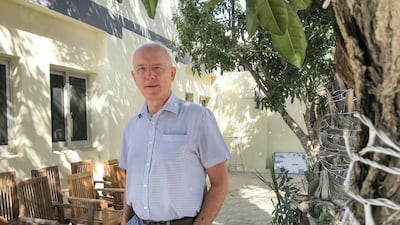In 1976, Dubai was largely unrecognisable from today’s sprawling metropolis.
Back then, the now Rev Paul Burt had just arrived in the UAE from the UK to work for an air-conditioning firm.
So began his growing fascination for the region, an interest which six years ago saw him take up a job as head of a seafarer’s charity in the Emirates.
The group is currently working to rescue forty sailors left stranded at sea in Dubai for more than two years. They are hoping will be brought ashore very soon.
Now, more than 40 years on from his first stay in the Gulf, the father-of-three has retired from the role in which he dedicated himself to assisting seamen in trouble.
“There were far fewer westerners than there are today so it was an interesting place to work,” said Mr Burt, referring to his initial arrival in Dubai in the 1970s.
“I remember the beginning of Jebel Ali port development, the scale of ambition of Sheikh Rashid was very clear.
“I stayed until 1982 and then returned home to the UK. I didn’t want to stay in management and had a strong Christian upbringing that had been my foundation in life.
“I resigned, got married and decided to begin my training with the church.”
Aged 30, Mr Burt began working as a junior clergyman in Edinburgh, Scotland.
But when a posting came up at St Christopher’s Church in Bahrain, he jumped at the chance to return to the Gulf.
At that time the first Gulf War was upending the relative stability of the region and part of his work involved comforting expatriate families driven apart by the conflict.
“As a clergyman, you see the extremes of life,” he said.
“You attend christenings, and funerals of course. I have seen more dead bodies than most people have seen dead animals.
“It is hard to deal with as you are sometimes lost for words. An arm around the shoulder can be much more authentic than a frank expression.
“You have to be realistic and honest in life. The best clergy are those who are continuously learning. You can’t expect to have all the answers.”
As the conflict escalated, Mr Burt returned home with his young family to take up a role back in Scotland at the Holy Trinity Church in Melrose, where he stayed for a decade.
He then moved south and became chaplain and head of religious studies at a school in Winchester.
When an opportunity arose to return to Dubai as clergyman at the Mission to Seafarers charity, Mr Burt seized the chance to take on a new challenge.
“I like ships and the sea so the job ticked lots of boxes,” said Mr Burt, now 66.
“I arrived in 2012, and shortly afterwards the job was expanded to my becoming regional director covering as far as Bangladesh and Sri Lanka.
“The mission had a role in Dubai since 1962 so it is well respected and attracted much support, particularly as Dubai has always been intrinsically linked to the maritime world.”

Seafarers are often at the mercy of their paymasters when things go awry.
essels can be left stranded at sea, with their crews abandoned for months or sometimes even years without pay and supplies.
Mr Burt said that at any one time hundreds of vessels are anchored off the Arabian Gulf coastline of the UAE, awaiting permission to unload their cargo at port. Up to 20 per cent of these ships can often be involved in some kind of contractual dispute, sometimes leaving their seamen in bizarre legal limbo.
“In one case, two Filipino crew had been unable to leave their vessel for three years,” he said.
“Another ship had one Indian crew member on-board who had been alone for nine months waiting for help.
“They didn’t want to leave their ship as they had not been paid, and the company had retained their passports.”
In February, the International Transport Workers’ Federation signed an agreement with the UAE's Federal Transport Authority to work together to protect the rights of all seafarers operating in Emirati waters.
It will allow the two bodies to consult, co-operate and co-ordinate jointly, finding solutions to complex legal disputes resulting in the abandonment of seafarers.
“The one thing I have looked back on with satisfaction over the past six years is developing stronger links with the authorities here to protect seafarers,” said Mr Burt.
“There are criminal agencies in India selling staff to shipping companies, but new legislation in the UAE now requires companies to have extra insurance to protect crew so they are paid if a company goes bust.
“It [the Mission to Seafarers] has provided economic pressure to force these rogue companies out of the market.
“That is a huge change and because of that we are seeing less vessels become involved in disputes.”


